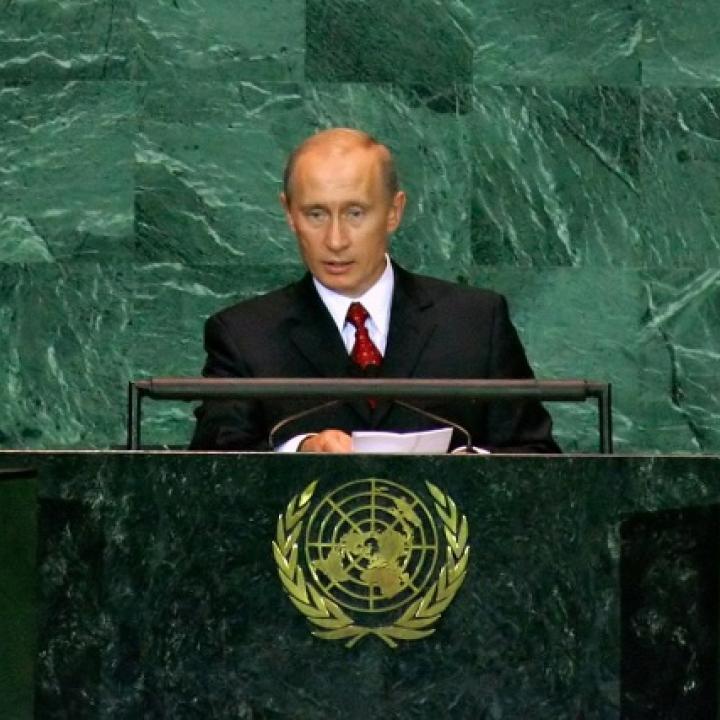
- Policy Analysis
- Articles & Op-Eds
Putin Is in Big Trouble in Ukraine, but Still Eyes Middle East Conflict
Also published in 19FortyFive

The Russian leader and Hamas share the goal of undermining liberal democracies, as correctly pointed out by President Biden.
As the West shifts attention to the Middle East, it cannot afford to take its eye off Vladimir Putin. If the ensuing chaos distracts us from Ukraine, it will further empower the Russian autocrat in achieving his global aims. Worse, it may inspire other bad actors to do the same.
Russia Cozies Up to Nations Unfriendly to the West
Russia’s casualties in Ukraine continue to mount amidst the latest offensive, but the war continues unabated. The Kremlin sees this war as a proxy for an existential battle with the West. Rather than back down, Putin continues to bolster his ties outside the liberal free world. These relationships help him garner resources to continue to fight Ukraine and undermine the West.
While Moscow and Beijing continue to bolster ties even further, analysts are becoming increasingly wary that the West will likely have to face Russia and China’s actions together as one strategic set. This occurs as North Korea may be arming Russia to help it fight in Ukraine.
Russia’s relationship with Iran, already on an upward trajectory for years before the invasion of Ukraine, has been edging closer to a defense partnership. It is hardly news that Russia’s arms have found their way to Hezbollah and Hamas for years or that leaders of both organizations have made trips to Moscow. Indeed, Moscow does not consider either to be a terrorist organization. Palestinian President Mahmoud Abbas meanwhile is expected to come to Moscow in the near future.
Middle East Power Broker
Putin’s Russia has cultivated an image as something of a Middle East power broker, but in reality Putin has always leaned closer to anti-American forces in the region. His response after the Hamas attack, wherein Putin laid the blame on U.S. regional policies, simply highlights this reality more explicitly.
Putin is well aware that the Ukraine war has not gone according to plan. But this is precisely why he may use this situation to escalate against the West. Prior to the Hamas attack, Putin was already seeking ways to impose maximum costs on the West with minimal cost and effort, working through low-level crises in the Balkans, South Caucasus, Middle East, and Africa. In Latin America, the Wagner Group had been useful in propping up friendly governments.
If the West gets distracted from Ukraine, Putin will further take advantage of these opportunities. These could include cyber operations against U.S. forces, disinformation campaigns, and the use of Wagner to support Hezbollah and other anti-American actors. In his October 19 address, urging the provision of aid to Ukraine and Israel, President Biden rightly said that both Hamas and the Kremlin aim to undermine liberal democracies. As Congress continues to debate the aid package, nothing can pass until the House of Representatives selects a speaker and is ready to legislate again.
In the meantime, Western policymakers need to think about how to impose costs on Moscow in a way that outweighs the benefits of escalation. Otherwise, Moscow will have no incentive to change its calculus. Indeed, this summer saw increasing tensions with the U.S. in the skies over Syria through harassment of U.S. drones. This cost of escalation did not outweigh the benefits to Moscow’s position in the Middle East. This harassment stopped after the U.S. sent F-35s to the region, but there is no guarantee it won’t resume again. Policymakers also need to think strategically across the global stage and look at linkages across multiple theaters and shifting power balances there, as the Kremlin does.
True, an escalation in the Middle East may also pose long-term challenges to Putin. By aligning more explicitly with Iran and Hezbollah, he may no longer be able to play mediator as he had in the past. Nor does he need to get himself in the middle of another war. But the fact of the matter is that the prospects for such a war remain unclear, and no matter how much Putin plays the neutral mediator role, he chose a side a long time ago. The Hamas attack doesn’t change that.
In 2015, President Obama’s naiveté—his ill-advised belief that Russia would find itself militarily bogged down in Syria—allowed Russia to come to Israel’s doorstep. Rather than get stuck in Syria, Putin used it as a springboard for greater power projection against the West at minimum cost. This position also empowered Putin’s war on Ukraine. More to the point, Putin has had over two decades of experience navigating difficult crises. Rather than hope for another quagmire for Russia post-Hamas, Western policymakers need to think creatively about how to impose costs on Moscow in a way that imparts to Putin and his inner circle that the costs of escalation, whether directly or through proxies, outweigh the benefits. At present, sending mixed signals will only benefit our adversaries.
Anna Borshchevskaya is a senior fellow in The Washington Institute’s Diane and Guilford Glazer Foundation Program on Great Power Competition and the Middle East. This article was originally published on the 19FortyFive website.


